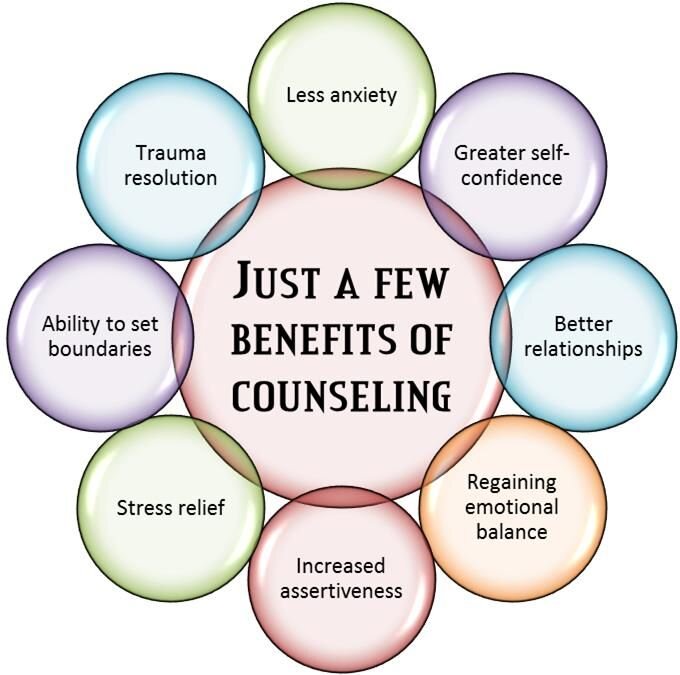How to Find Mental Health Resources in Your Local Community
Wiki Article
The Importance of Mental Wellness: a Deep Study Counseling, Therapy, and Their Benefits
Mental health and wellness significantly shapes private well-being, influencing feelings, behaviors, and ideas. Therapy and therapy work as necessary opportunities for healing and individual advancement. They use organized assistance, aiding individuals navigate life's challenges. Yet, numerous stay unaware of the certain types of treatment available and their distinct advantages. Understanding these aspects is crucial for any individual considering expert psychological health and wellness support. What complies with may illuminate courses to resilience and fulfillment that several neglect.Recognizing Mental Health and Its Impact
Although mental health is usually ignored, it plays a crucial role in overall wellness and day-to-day performance. It encompasses psychological, emotional, and social factors that affect exactly how people believe, feel, and behave. A person's psychological health directly influences their capability to manage tension, connect to others, and make selections. Poor psychological wellness can cause various concerns, consisting of anxiousness, depression, and problem in preserving partnerships, all of which can prevent expert and individual growth.Furthermore, psychological health has far-ranging ramifications for physical health and wellness. Persistent anxiety and without treatment psychological conditions can add to various physical disorders, such as cardiovascular disease and deteriorated immune feedbacks. On the other hand, positive mental health and wellness promotes resilience, making it possible for people to deal with life's challenges successfully. Understanding mental health and wellness's value is crucial for cultivating supportive atmospheres that promote emotional health, therefore improving the high quality of life for areas and individuals alikeThe Various Kinds Of Therapy and Therapy
In the domain of mental health and wellness, numerous counseling and treatment types deal with varied needs. Individual therapy techniques focus on personal problems with one-on-one sessions, while group therapy dynamics foster shared experiences and assistance amongst participants. Understanding these methods is vital for picking the ideal treatment for various obstacles.Specific Counseling Approaches
Various individual counseling methods exist, each developed to deal with details psychological health concerns and cater to varying client needs. Cognitive Behavioral Therapy (CBT) focuses on identifying and changing adverse idea patterns, while Psychodynamic Treatment discovers past experiences and subconscious processes. Humanistic Treatment highlights personal growth and self-actualization, cultivating a supportive setting. Social Treatment (IPT) targets connection issues and communication patterns to boost psychological wellness. In addition, Approval and Dedication Therapy (ACT) urges clients to accept their thoughts and sensations while devoting to personal values. Each approach offers one-of-a-kind techniques and philosophies, enabling experts to customize their approaches to the individual, therefore boosting the healing experience and promoting mental health and wellness recovery.Group Treatment Dynamics
Group therapy dynamics encompass numerous therapeutic techniques that utilize the power of social relationships and common experiences. This type of therapy commonly includes varied groups, cultivating a secure environment for individuals to share feelings and ideas. Key sorts of team therapy consist of support groups, which provide psychological support; process-oriented groups, concentrating on social communications; and psychoeducational groups, focused on passing on knowledge regarding mental wellness issues. The dynamics within these teams can improve self-awareness, as members typically assess their behaviors in connection to others. In addition, group therapy promotes a feeling of belonging, decreasing feelings of isolation. Through shared stories and collective analytical, participants can establish dealing strategies and gain insights, inevitably adding to private development and healing.The Duty of Therapy in Mental Health
Counseling plays a necessary role in mental health by supplying different techniques customized to specific demands. These techniques supply specialist assistance that can lead to substantial improvements in emotional health. Understanding the different kinds of therapy can help people make informed decisions about their mental healthcare.
Types of Therapy Techniques
While different counseling strategies exist, each deals unique methodologies and insights right into psychological wellness therapy - Marriage Counselling. Amongst the most noticeable are cognitive-behavioral treatment (CBT), which concentrates on modifying negative thought patterns; psychodynamic therapy, which checks out unconscious processes and childhood years experiences; and humanistic methods, highlighting individual growth and self-actualization. In addition, solution-focused quick therapy focuses on finding solutions in the existing instead of diving right into problems. Team treatment cultivates neighborhood and shared experiences, while family therapy addresses relational characteristics within domestic frameworks. Each technique satisfies different demands, lining up with private choices, issues, and restorative goals. Comprehending these techniques aids clients make notified selections regarding their mental health and wellness journey and advertises effective treatment tailored to their special conditionsAdvantages of Professional Support
Various people profit from professional advice in handling their mental wellness difficulties. Therapy supplies a safe space for customers to explore their ideas and feelings without judgment. This healing environment promotes self-awareness, permitting people to determine patterns in their behavior and create much healthier coping techniques. Expert assistance additionally offers accessibility to evidence-based strategies that can relieve signs and symptoms of anxiousness, anxiety, and other mental wellness concerns. Furthermore, therapists can assist in setting realistic goals and supply assistance in achieving them, boosting total wellness. The joint relationship in between therapist and client is important, as it promotes liability and motivates personal growth. Eventually, specialist assistance plays an essential duty in guiding psychological wellness journeys, bring about enhanced emotional strength and life satisfaction.Advantages of Treatment: Recovery and Development

Just how to Select the Right Specialist or Counselor
How can one navigate the usually overwhelming procedure of choosing the right specialist or counselor? Identifying individual demands is necessary; individuals should consider their specific problems, whether anxiousness, depression, or relationship obstacles. It is helpful to research different healing methods, such as cognitive-behavioral treatment Check Out Your URL or psychodynamic therapy, to discover an appropriate match.Next, prospective clients must seek references from relied on resources or use on the internet directory sites. It is important to review therapists' qualifications, including their education and learning, licensing, and areas of expertise. Arranging preliminary assessments can help determine compatibility, permitting individuals to evaluate communication designs and individual comfort.Finally, logistical aspects, such as place, availability, and charges, should also be considered. By thoughtfully evaluating these aspects, one can make an informed choice, inevitably fostering a healing partnership that supports mental health and personal development.Getting Rid Of Stigma: Accepting Mental Health And Wellness Support
While social mindsets toward mental health have actually developed, preconception still offers a significant barrier for many looking for assistance. This preconception typically shows up as misunderstandings bordering mental disease, leading individuals to really feel embarassment or anxiety concerning their battles. Lots of people think twice to pursue counseling or treatment as a result of bother with being evaluated or labeled. Overcoming this stigma is essential for fostering a helpful atmosphere where people can honestly discuss their psychological health needs.Communities and companies play an important function in this transformation by promoting awareness and education and learning regarding psychological wellness concerns. Initiatives that highlight personal tales can humanize these experiences, encouraging others to look for aid without worry. As approval expands, individuals may really feel much more empowered to accept mental health and wellness assistance, acknowledging try these out it as a crucial aspect of overall well-being. By dismantling stigma, society can grow a culture of understanding, empathy, and proactive mental healthcare.Strategies for Preserving Psychological Wellness Outside of Treatment
Although therapy offers valuable assistance, maintaining psychological health beyond sessions is equally vital. Individuals can apply several methods to sustain their mental health. Normal exercise plays a necessary function, as exercise advertises the launch of endorphins, which enhance mood. Additionally, a balanced diet plan abundant in nutrients can greatly affect psychological stability and energy levels.Practicing mindfulness and reflection assists individuals manage stress and anxiety and establish better self-awareness. Developing a constant rest routine is additionally basic, as top quality rest is essential for cognitive feature and emotional regulation.Engaging in social tasks fosters connection and minimizes sensations of isolation. Pursuing passions or leisure activities can give an imaginative electrical outlet and boost self-confidence. Finally, exercising and setting practical goals self-compassion allows people to grow durability. By integrating these methods right into every day life, individuals can efficiently sustain their mental health beyond therapy sessions.Regularly Asked Inquiries
:max_bytes(150000):strip_icc()/depressed-man-lying-on-couch-talking-to-therapist-748319455-5a612746eb4d520037d78ca6.jpg)
Exactly How Can I Tell if I Need Treatment?

Determining the requirement for treatment typically involves identifying relentless feelings of unhappiness, anxiousness, or frustrating stress and anxiety. If daily functioning comes to be tough or coping systems fail, seeking specialist support might be a helpful progression.
What Should I Anticipate in My Initial Treatment Session?
In the first therapy session, people can anticipate an intro, conversation of their factors for seeking assistance, and an introduction of the specialist's technique, producing a structure for future conversations and developing convenience in the restorative area.Are Online Therapy Procedure as Effective as In-Person Ones?
Research study shows that online treatment sessions can be as effective as in-person ones. Aspects such as the specialist's certifications, customer involvement, and the healing connection substantially affect outcomes, despite the tool utilized.Can Therapy Help With Connection Issues?
Treatment can help individuals in addressing relationship problems by offering devices for interaction, recognizing feelings, and dealing with disputes. Cognitive Behavioural Therapy. It promotes healthier dynamics and encourages personal development, ultimately cultivating stronger, extra satisfying links between companionsHow Much Time Does Therapy Generally Last?
Treatment duration differs substantially based on specific needs and objectives. Typically, sessions may last from a couple of weeks to a number of months, with some people participating in recurring therapy to deal with long-term issues and personal development. Cognitive Behavioral Therapy (CBT) concentrates on determining and altering unfavorable thought patterns, while Psychodynamic Therapy discovers subconscious processes and previous experiences. Key types of team therapy include support groups, which provide emotional support; process-oriented groups, concentrating on social interactions; and psychoeducational groups, intended at giving knowledge about mental health concerns. Amongst the most famous are cognitive-behavioral treatment (CBT), which focuses on altering negative thought patterns; psychodynamic treatment, which explores unconscious procedures and childhood years experiences; and humanistic approaches, stressing personal growth and self-actualization. Team treatment fosters community and shared experiences, while family members therapy addresses relational dynamics within domestic structures. It is advantageous to study different restorative approaches, such as cognitive-behavioral therapy or psychodynamic treatment, to find an ideal match.Next, potential clients must look for references from relied on sources or use on-line directory sites.Report this wiki page